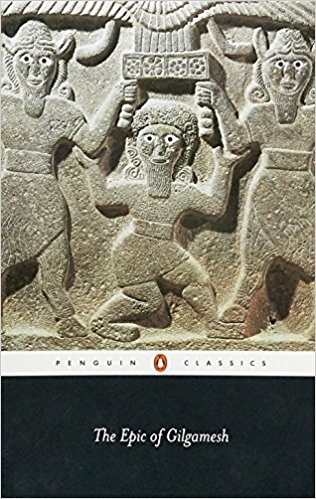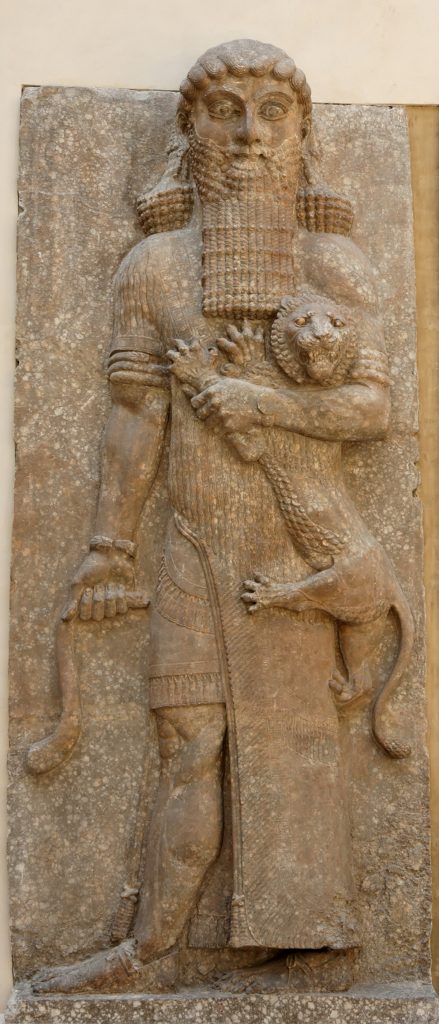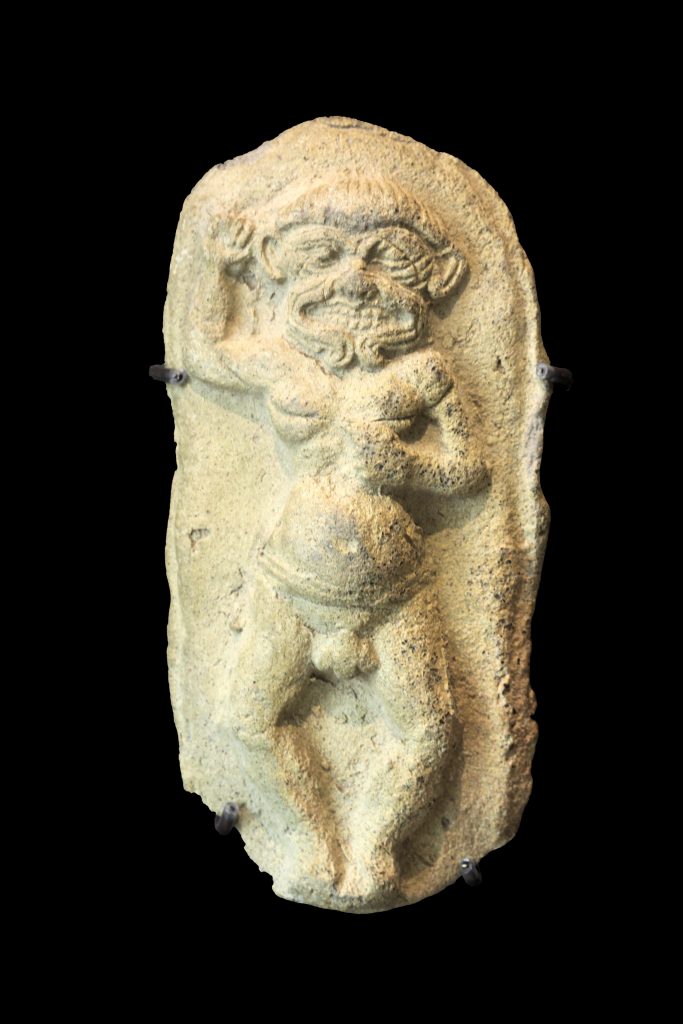The Epic of Gilgamesh Summary
9 min read ⌚
 “The Epic of Gilgamesh” is the oldest work of literature that has reached us.
“The Epic of Gilgamesh” is the oldest work of literature that has reached us.
And it is a masterpiece – according to quite about everyone.
Read its summary to find out why!
Who Should Read “The Epic of Gilgamesh”? And Why?
Just think of it this way: as far as we know, before “The Epic of Gilgamesh” there was no literature whatsoever. So, reading it is something like watching cave paintings, or hearing the sound of Neanderthal drums.
Read it – so you can witness firsthand the birth of literature.
If you want to, you can also listen to some part of it. Because literature was intertwined with music for most of human history.
Anonymous Biography
Just like in the case of “Diary of an Oxygen Thief” we don’t really know who authored “The Epic of Gilgamesh.” However, in this case, he has neither website nor a Twitter account.
For two reasons.
First of all, because he’s dead for about four millennia.
And secondly, because “he” is probably a “they.” Namely, we’re not talking about an author, but authors.
Because that’s how they rolled in the days of yore. They remembered whole epics by heart and they sang them to each other, modifying them from generation to generation.
However –
There is one funny sounding name we are obliged to mention, and that is Sîn-lēqi-unninni. He was a mašmaššu (that is, some kind of a warlock-doctor), and, much more importantly, the guy who compiled the best-known version of Gilgamesh, the one we’re about to retell you in a second.
So, thank you, Sîn-lēqi-unninni: you rock!
Plot
For all intents and purposes, Gilgamesh was the superhero of the Ancient Mesopotamian world.
In other words, all that we are not and all that we will never be.
Don’t believe us?
Here’s how the poem starts:
I will tell of the history of Gilgamesh, he who knows all that has happened and has seen all the lands of the world, he who has seen all kinds of wisdom and knows the mysteries and has seen what is hidden. He bringeth news dating farther back than the deluge. He has traveled far-distant roads and became weary, and now he has engraved on standing stones the whole of the story.
When the gods fashioned Gilgamesh, to him they gave a perfect form. The glorious sun Shamash bestowed upon him glory; Adad the terrible god of storms bestowed upon him courage. The great gods perfected his magnificence beyond all others, terrible like the great wild bull. Two-thirds god they made him; one-third man they made him.
So, in a nutshell, an omniscient world-weary traveler/wizard/writer with the perfect body and the face of Brad Pitt!
Well, judging by a probable visual representation of Gilgamesh, the Brad Pitt comparison may be a bit of a stretch – even if we’re talking about Pitt’s bad beard days:

OK, it seems that in Mesopotamia they had some different concepts for beauty – such which would have probably made Aubrey de Grey the talk of Uruk – which, by the ways, is the city-state where Gilgamesh is the king.
However, he’s not exactly a good king.
Just think of Spiderman 3 or, even better, Anakin Skywalker turning into Darth Vader.
Yes – we’re talking about forced labor in the case of men and rape as far as women are concerned. Gilgamesh was all but a nice king.
But hey – what were the people of Uruk supposed to do?
He was, after all two-thirds a god! Which means that the only ones better than him were… well, those who are three-thirds gods.
That is, the gods.
So, the people of Uruk cried unto them looking for some help.
And they got some in the form of another man the goddess Aruru fashions in the famous Biblical way – out of clay.
(And we couldn’t even finish our school project!)
This other man is called Enkidu and is quite uncivilized, living with the animals, suckling at their breast and drinking at their watering holes.
A trapper happens upon him and, probably believing that he’s just seen Big Foot, he is terrified. So, he goes to Uruk and asks for some help.
When he comes back, he is with Shamhat, a temple-prostitute.
Why a prostitute, you might ask?
Well, because, for some reason, our ancestors believed that having sex with one should turn a wild man into a civilized individual. (Come to think of it, Siddhartha experienced something similar.)
And that’s exactly what happens to Enkidu who, suddenly, realizes that animals are bad and that Shamhat is good.
Can’t blame him, can you?
He also realizes (something tells us that he may have been manipulated into thinking this) that Gilgamesh is a bad king.
And it’s not like Gilgamesh does something to make him believe otherwise, since when Enkidu arrives in Uruk, Gilgamesh is just about to add another rape to his tally.
There’s a scuffle and Gilgamesh eventually prevails.
However, he doesn’t merely get the win – he also gets a friend.
And from here on, Gilgamesh and Enkidu are inseparable buddies.
And, of course, they have adventures! Otherwise, this would have been the end of the epic.
First, they go to the Cedar Forest and decide to kill Humbaba, the ogre who guards it. Based on an ancient visual representation of the monster, we strongly believe that Jim Carrey’s tribal opponent in “Ace Ventura” may have been based on Humbaba:

After some time, the goddess Ishtar falls in love with Gilgamesh and proposes him. Quite advanced and liberal this Mesopotamian society, but also quite monster-infested!
Because after Gilgamesh declines (for the reason that Ishtar shares one trait with female praying mantises which should repel any man from having sex with her), Ishtar sends him the Bull of Heaven to punish.
However, Gilgamesh and Enkidu are victorious yet again. And blasphemous also – since, after the victory, Enkidu throws one of the Bull’s legs in Ishtar’s face.
That – coupled with the killings of Humbaba and the Bull of Heaven – might have been a bad judgment on Enkidu’s part.
Since, you know, gods aren’t that pleased when you challenge them. And, unlike humans, they are almighty.
Well, Enkidu finds this out the hard way: after he dreams that he will be punished, he – well – is. He falls ill and, after much suffering, dies.
Gilgamesh is absolutely and completely devastated!
Really – you wouldn’t even recognize the king of Uruk at this moment!
I mean, to hear the guy who killed ogres and bulls and raped anything with two feet and breasts moan like this:
I shall die and become like Enkidu, but weeping has entered into my heart; fear of death has befallen me, and I lie here stretched out upon the ground. To find Utnapishtim, the son of Ubar-Tutu, I will set out, and I will go at once. At the mountain ravine I arrived by night-time. Lions I saw, and I was afraid; but I lifted my head to the god Sin and I prayed. To the majesty of the god came my cry, and he hearkened and saved me, even me.
We call it karma, you say.
And also – Utnapishtim? Who is that guy?
And why does Gilgamesh want to meet him?
Let’s just say that If Utnapishtim had existed in our world, you would have wanted to meet him as well. Because, as we find out soon, he is the only human being who has been granted immortality by the gods.
And also – he is Noah.
Because as we learn once Gilgamesh reaches him – and, boy, he leaves far, far away – Utnapishtim had survived a Flood.
As in – the Flood you’ve read about in the Bible. This time happening in Mesopotamia way before the people writing the Bible were even born.
You know the story:
The gods were mad and decided to wipe away humanity. One of the gods – unlike the Jews, the Mesopotamians had a bunch of them – Ea, tells Utnapishtim and his wife about the wicked plan.
Following his advice – why would he not? – Utnapishtim builds a gigantic ark on which he takes his family and “all the animals in the field.”
And there is a Flood alright – and there is nothing but Utnapishtim’s ark afterward. And, for some reason, the gods grant Utnapishtim immortality.
“Great story,” says Gilgamesh, “but is there a point? I want to be immortal and your story doesn’t help me one bit.”
“Because, Utna” – we guess Gilgamesh would have preferred to use a nickname – “I don’t see any Floods around here! Making the building of an ark quite redundant!”
“So, please, tell me straight away: can I be immortal in some other way?”
“Well, Gish” – and that is an actual nickname from the epic – “I don’t think you’re worthy of immortality,” says Utnapishtim.
Which is a fancy way of saying “Yes, you can, but I don’t think I want to tell you.”
To prove Gilgamesh his unworthiness, Utnapishtim challenges him to a staying-awake duel, Jesus-in-Gethsemane-style.
And just like Jesus’ apostles, Gilgamesh fails miserably and Utnapishtim sends him back.
Fortunately, Utnapishtim’s wife…
The Epic of Gilgamesh Epilogue
Wait a minute! Where did she come from? Wasn’t Utnapishtim the only man who had been granted immortality by the gods?
Well, technically, he was. If by “man” you mean “fella”. Which humanity, unfortunately, seems to have meant for most of our history.
So, yes, the poet (just like most poets) forgot about Utnapishtim’s wife before. Fortunately, she didn’t forget about Gilgamesh. At her request, Utnapishtim calls back Gilgamesh and tells him that there is a plant which will restore the youth of anyone who eats it.
Gilgamesh finds the plant on the bottom of the sea and takes it with him. As he tells Urshanabi, his ferryman, he has some specific plans with it:
I will take it to Uruk the strong-walled, I will give it to the old men to eat. Its name shall be ‘Even an old man will be rejuvenated!’ I will eat of this and return (again) to the vigor of my youth.
However, as Gilgamesh is taking a bath, a snake comes by and eats the plant.
(It had to be the snake of all animals yet again, ha?)
And this snake passes Gilgamesh’s test perfectly – since it sheds its skin and becomes young again.
However, now it makes no difference for Gilgamesh, since, he doesn’t have even a leaf for himself. Even so, he stays surprisingly calm afterward.
And as he and Urshanabi reach Uruk, watching the city walls he once built, he finally realizes that even though he will eventually die, he can use his life to create some works which will remain.
Instead of just raping women and exhausting men.
And, if we judge by the opening paragraph, the next thing he did was embarking on a writing career. Or, in other words, engraving his walls with the story we just told you.
A great idea, since, even though Uruk is no more, “The Epic of Gilgamesh” is still as entertaining as ever!
Which makes you think of a great poem by Horace – whose subject is the very same poem:
I have built a monument
Which will last more years than bronze,
Which will reach far higher than
That royal pile of Pyramids,
Which gnawing rain and furious
North winds lack power to destroy,
Nor chain of years, nor flight of time.
Oblivion won’t be complete,
The greatest part of me will live
Beyond the grasp of greedy death.
Like this summary? We’d like to invite you to download our free 12 min app, for more amazing summaries and audiobooks.
“The Epic of Gilgamesh PDF Quotes”
As for human beings, their days are numbered, | and whatever they keep trying to achieve is but wind! Share on X Hold my hand in yours, and we will not fear what hands like ours can do. Share on X Gilgamesh, where are you hurrying to? You will never find that life for which you are looking. When the gods created man they allotted to him death, but life they retained in their own keeping. Share on X Day and night, night and day, dance and be merry, feast and rejoice. Let your clothes be fresh, bathe yourself in water, cherish the little child that holds your hand, and make your wife happy in your embrace; for this too is the lot of… Share on X I will set up my name in the place where the names of famous men are written, and where no man’s name is written yet I will raise a monument to the gods. Share on XOur Critical Review
Even if it hadn’t been the oldest literary work – say, if it had been written in the time “Beowulf” was – “The Epic of Gilgamesh” would have been considered a masterpiece, nevertheless.
Quite fittingly, it’s mainly about the ephemeral nature of life and the immortality of men’s works. And though an epic, it has few lyrical passages as well! In addition to adventures, monsters, quests and the first depiction of the Flood!
So all-in-one entertainment with historical value!
Can you ask for more?
Emir is the Head of Marketing at 12min. In his spare time, he loves to meditate and play soccer.







